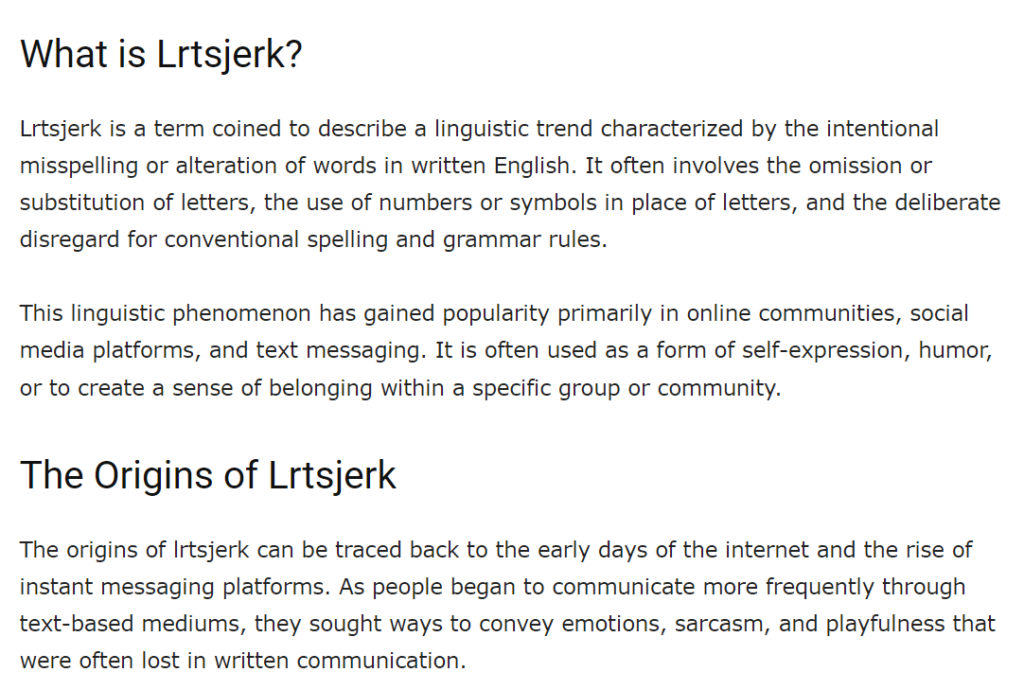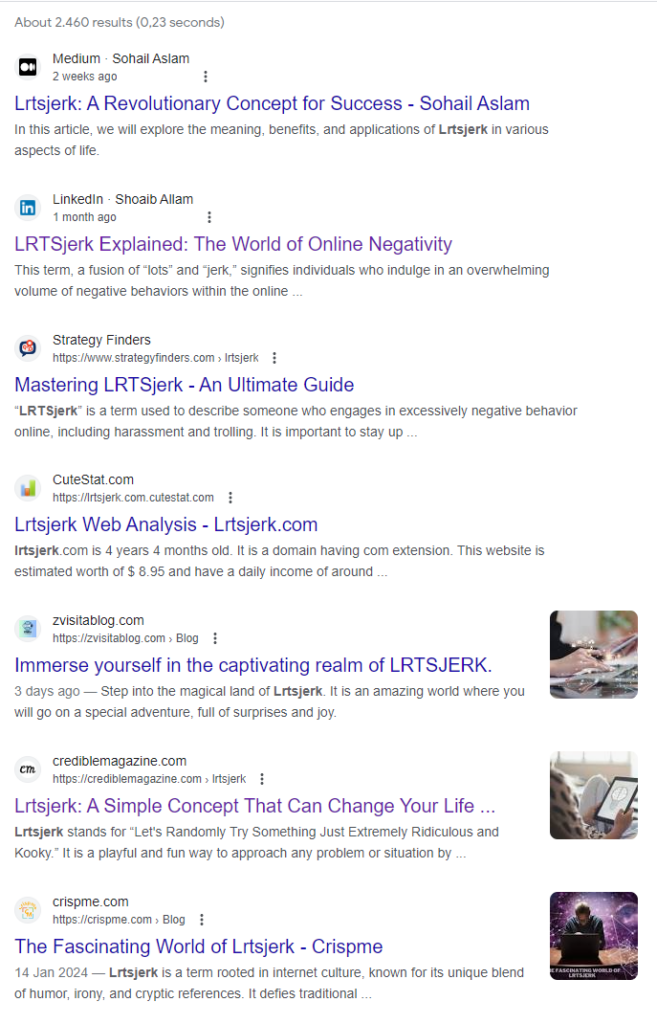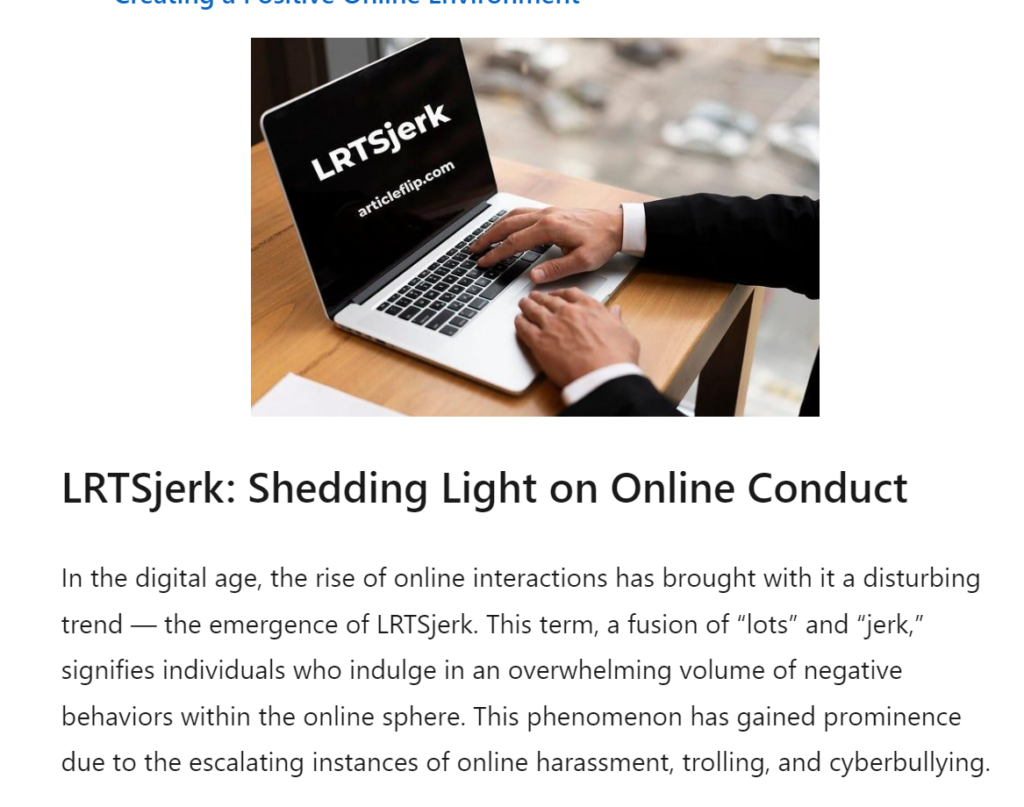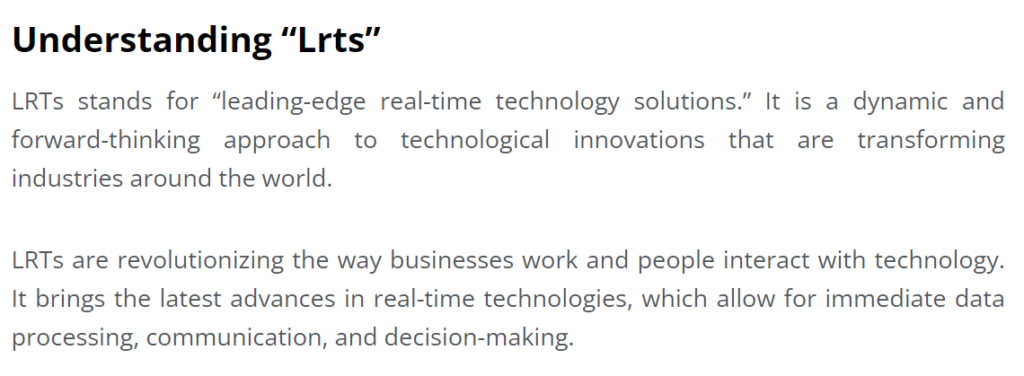For my newsletter on English language change, I monitor the web using good old Google Alerts. I’ve set up search queries such as “English linguistics” and “Gen Z slang”, and once a week Google sends me all the new results that have been put on the web with those keywords.
In the past few months, I have been sent articles that were clearly written by AI, and I’d like to share the most recent one with you: “The Rise of Lrtsjerk in English: A Linguistic Phenomenon“. The whole article is a linguist’s nightmare. It is utter drivel.
I have copy-pasted a few bits of it, because my experience suggests the article may disappear soon.

![Transcription: 1. Informal Communication:
Lrtsjerk has become an integral part of informal communication, particularly in online spaces. It allows individuals to express themselves more creatively, convey emotions, and establish a sense of camaraderie within online communities.
[block] See also The Fascinating World of "Käämyäjä": Unveiling the Secrets of this Finnish Tradition
However, this informal style of communication can also lead to misunderstandings, especially when interacting with individuals who are not familiar with lrtsjerk or its conventions.
2. Language Evolution:
Lrtsjerk reflects the ever-evolving nature of language. It demonstrates the adaptability of English to new forms of communication and the influence of technology on linguistic trends. It also highlights the creativity and inventiveness of language users.](https://englishinprogress.net/wp-content/uploads/2024/01/image-13-1024x849.png)
There are many more articles about “lrtsjerk”
I wouldn’t be a proper linguist if I didn’t google “lrtsjerk” to check if perhaps it was a term that was in use, “an integral part of informal communication” as the article stated. Perhaps it was just me under my cosy rock who hadn’t heard of it.
And my first reaction after that Google search was: oh dear, it was me, look at all these results. 2460 of them.

But then I started looking into the results.
The many different definitions of “lrtsjerk”
I decided to look at the definitions for Lrtsjerk given by the articles. Only the top two results were from sites I recognised. The top result, a Medium article, doesn’t seem finished. It only shows an introductory paragraph, and does not give a definition.
Here are some of the definitions I found in the other articles.
1. A group of online jerks
The second result was an article on LinkedIn. According to this article, Lrtsjerk refers to “individuals who indulge in an overwhelming volume of negative behaviors within the online sphere” and comes from the words “lots” and “jerk”

2. A leading technology solution
After Medium and LinkedIn, all the results were sites that I had never heard of. The third result, on a site called Strategyfinders, starts by following the LinkedIn definition “someone who engages in an excessive amount of negative conduct online”

It then goes on to contradict itself by saying that “Lrts” is “leading-edge real-time technology solutions,” a dynamic and forward-thinking approach to technological innovations that are transforming industries around the world.

3. An out-of-the-box way of thinking
Crediblemagazine goes in a completely different direction and writes “Lrtsjerk stands for “Let’s Randomly Try Something Just Extremely Ridiculous and Kooky.” It is a playful and fun way to approach any problem or situation by randomly trying something completely out of the box and unexpected.”

4. A magical land
For zvisitablog Lrtsjerk is a “magical land” with no further definition, but the AI manages to fill the page with 1753 words of absolute inane gunk, anyway.

5. A full-body workout with ancient roots
Ventsmagazine, which according to its own stats has hundreds of thousands of followers on Social Media, has a completely different take: “lrtsjerk combines elements of cardio, resistance training, and stretching for a full-body workout. The name comes from the Finnish words meaning “full body release.”” The article has 6 chapters.

6. An app
“Lrtsjerk is a cutting-edge software application designed to simplify your daily routines and tasks. It’s an all-in-one solution that aims to make your life easier and more organized.”

7. A linguistic trend
And, of course, there’s the article that first clued me into Lrtsjerk, the one I detail above. Lrtsjerk describes “a linguistic trend characterized by the intentional misspelling or alteration of words in written English. It often involves the omission or substitution of letters, the use of numbers or symbols in place of letters, and the deliberate disregard for conventional spelling and grammar rules.”
I’m sure there were more definitions. With 2460 Google hits, there must have been. But this is where I stopped reading them.
Double-checking: it really isn’t a word
“Lrtsjerk” has never been used on Reddit, and a search on X gives me four links to the kinds of garbage articles mentioned above, but no actual human conversations. It is not a word used by humans.

Why all these articles? What’s in it for them?
What I think is happening is that these websites are churning out several AI articles per hour, based on any and all Google queries. Their logic perhaps being that even if every article gets just one or two hits, it will still mean the site itself gets many hits in total. And then I guess they are either in it for the ad revenue or they hope they can sell the website once it has a certain visitor count.
Another theory, which I got from posting a similar case on Reddit, is that these sites aim to be bad. This makes Google mark them as low-quality sites. They then add links to their site to innocent sites that have nothing to do with them. Google will then mark these innocent sites as low-authority sites, which means they get a lower ranking in Google. It is a way of eliminating the competition, of ensuring a higher ranking for some site that the AI-junk-writers are also affiliated with.
Do you have a theory? Let me know in the comments below!
Why “lrtsjerk”, though?
I think perhaps all these AI content farms are working from the same lists of Google queries, and these lists contain some typos. From the people doing the queries or from the people creating the lists, I don’t know. Perhaps it is a paper town kind of situation and the fake words have been added in on purpose?
When I was doing research for this article, at some point I misspelled “lrtsjerk” as “lrstjerk” and got no results, not a single one. That really suggests that there must be something going on with “lrtsjerk” to make it the star of 2460 articles.
It’s not just “lrtsjerk”
Just scrolling through one of the websites gives me the nonsense words “Ag2Ga46”, “Bertėjas”, and “KACMUN”. I think there are probably hundreds of these terms. Perhaps even thousands. (Not a paper town situation then, after all.)
Is “lrtsjerk” an actual non-word?
UPDATE: I have since learned the term “ghost word” fits rather nicely. These are nonsense words that accidentally made it into a dictionary or other reference work. More here.
It is a common theme among linguists that there are no non-existent words, because the moment a human being utters a new word and attaches meaning to it, that word is a word. But does that count for a human typo that is being given various different confabulated meanings by a non-conscious AI? I think we may have our first actual non-words, here.
Or perhaps we need to create a new lexical category? AI-non-words? NAIn-words? In fact, we could also call them lrtsjerks. Fits rather nicely.
All this scares me
I had to do a deep dive to prove to myself that “lrtsjerk” really wasn’t a word. People who do not have the time or the inclination to do this will probably believe one of the definitions that gets served to them.
And what will happen with this page you are reading right now? I think this is probably the only page to give a proper explanation about the “lrtsjerk” phenomenon. But I am also willing to bet it will get a low ranking in the Google results. Someone who encounters “lrtsjerk” somewhere and googles it for more information will likely not find this website.
In other words, the fact-checked information gets completely drowned out by thousands of sites with AI generated misinformation. It scares the hell out of me, and I can only hope that Google is working on a solution.
Update 05 Feb 2024: I have written a second article about the “lrtsjerk”-phenomenon here.
I also changed the title of this article. It used to be “lrtsjerk: non-words are now truly a thing, or: on how AI is flooding the internet with disinformation and it scares me”. Now it reads: “lrtsjerk: a ghost word that scares me.” (I can’t believe I just forgot about the existence of nonsense words in the first version of this article. I’m an English teacher! I teach Jabberwocky! For shame!)

Heddwen Newton is an English teacher and translator. She is fascinated by contemporary English and the way English changes. Her newsletter is English in Progress. More than 2300 subscribers and growing every day!
Follow me on LinkedIn or Bluesky

Not that this is necessarily relevant to your thesis here, but the first examples/descriptions of “lrtsjerk” are for an actual term: leetspeak. (https://en.wikipedia.org/wiki/Leet )Why AI decided that leetspeak == lrtsjerk, however, is a mystery to me.